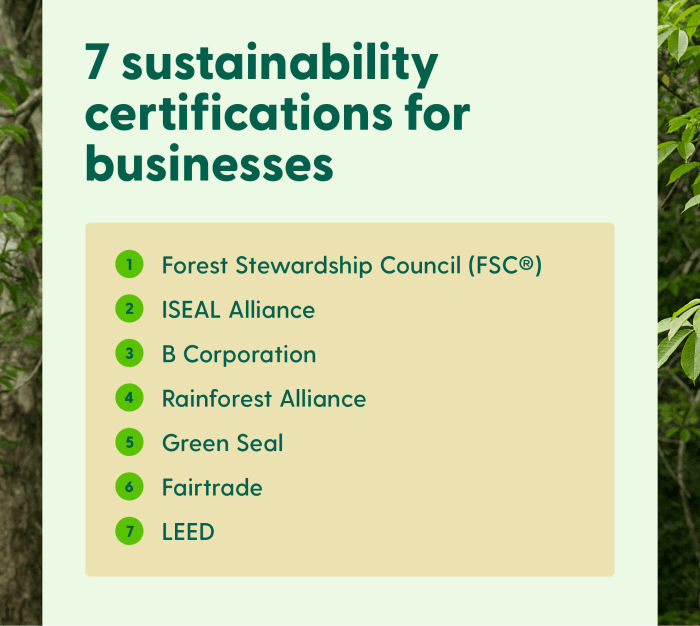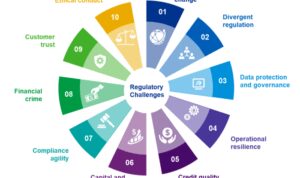Embarking on the journey of Green Business Certifications That Build Trust opens doors to a world where sustainability meets credibility. As companies strive to enhance their environmental footprint, the significance of reputable green business certifications becomes paramount in establishing trust among consumers and stakeholders alike.
Delving deeper into the realm of green certifications sheds light on the myriad benefits, environmental impacts, and consumer trust dynamics that shape the landscape of sustainable business practices.
Overview of Green Business Certifications

Green business certifications play a crucial role in building trust among consumers, investors, and stakeholders. These certifications validate a company's commitment to sustainable practices, environmental stewardship, and social responsibility. By obtaining a green business certification, organizations can differentiate themselves in the market, showcase their dedication to reducing their environmental impact, and enhance their reputation as socially conscious entities.
Key Features of Reputable Green Business Certifications
- Third-party verification: Reputable green business certifications involve independent, third-party organizations that assess and verify a company's sustainability efforts.
- Rigorous criteria: These certifications have stringent criteria that companies must meet to demonstrate their commitment to sustainability, such as resource efficiency, waste reduction, and renewable energy use.
- Transparency: Certified companies are required to disclose their environmental performance data and practices, promoting transparency and accountability.
- Ongoing evaluation: Green business certifications often involve regular audits and evaluations to ensure that companies continue to meet the established sustainability standards.
Types of Green Business Certifications Available
- LEED (Leadership in Energy and Environmental Design): Developed by the U.S. Green Building Council, LEED certification focuses on the sustainability of buildings and construction projects.
- Green Seal: Green Seal offers certifications for a wide range of products and services, ensuring they meet rigorous environmental standards.
- B Corp Certification: B Corps are certified for meeting high social and environmental performance standards, transparency, and accountability.
- Cradle to Cradle Certification: This certification assesses products based on their environmental impact throughout their lifecycle, encouraging circular economy principles.
Benefits of Green Business Certifications
Green business certifications offer numerous advantages for companies looking to demonstrate their commitment to sustainability and environmental responsibility. By obtaining these certifications, businesses can enhance their brand reputation, attract environmentally conscious customers, and differentiate themselves from competitors who are not environmentally friendly.
Enhanced Brand Reputation
Green business certifications can significantly improve a company's brand reputation by showcasing their dedication to sustainable practices. Customers are increasingly looking for businesses that prioritize environmental responsibility, and holding green certifications can help build trust and loyalty among eco-conscious consumers.
Companies with these certifications are perceived as more ethical and socially responsible, which can lead to increased customer satisfaction and positive word-of-mouth referrals.
Examples of Companies Benefiting from Green Certifications
1. Patagonia
This outdoor clothing company is known for its commitment to sustainability and has various green certifications, such as Fair Trade and Bluesign. These certifications have helped Patagonia attract a loyal customer base that values ethical and sustainable products.
2. Interface
As a leading manufacturer of sustainable flooring, Interface holds several green certifications, including Cradle to Cradle and Green Seal. These certifications have not only enhanced the company's reputation but also helped them attract environmentally conscious clients looking for eco-friendly flooring solutions.
3. Starbucks
The coffee giant has obtained LEED certifications for many of its stores, showcasing its commitment to energy efficiency and sustainable building practices. These certifications have reinforced Starbucks' image as a socially responsible company, appealing to customers who prioritize environmental stewardship in their purchasing decisions.
Environmental Impact of Green Business Certifications
Green business certifications have a significant positive impact on the environment. By implementing sustainable practices and meeting specific eco-friendly criteria, businesses can reduce their carbon footprint and contribute to a healthier planet.
Reduction of Carbon Footprint
Certified green businesses have been shown to significantly reduce their carbon footprint compared to non-certified businesses. According to research, companies with green certifications emit up to 40% less greenhouse gases and consume up to 50% less energy. This reduction in carbon emissions plays a crucial role in combating climate change and preserving the environment for future generations.
Contribution to Sustainability Goals
Green business certifications help companies align with sustainability goals by promoting the use of renewable energy sources, reducing waste, and implementing energy-efficient practices. These certifications encourage businesses to adopt environmentally friendly policies that not only benefit the planet but also lead to long-term cost savings and improved brand reputation.
Positive Environmental Effects
- Decrease in water and energy consumption
- Reduction in waste production and landfill contributions
- Preservation of natural resources and ecosystems
- Promotion of biodiversity and conservation efforts
Process of Obtaining Green Business Certifications
To obtain green business certifications, companies need to follow a specific set of steps and meet certain criteria to qualify for these certifications. By understanding the process and requirements, businesses can streamline their certification journey and demonstrate their commitment to sustainability.
Steps Involved in Obtaining Green Business Certifications
- Research Different Certification Programs: Companies should research and choose a credible green business certification program that aligns with their values and goals.
- Assess Current Practices: Conduct an internal audit to evaluate the company's current environmental practices and identify areas for improvement.
- Implement Green Initiatives: Implement sustainability measures and practices to meet the criteria set by the certification program.
- Submit Application: Complete the application process, providing documentation and evidence to support the company's green efforts.
- Undergo Evaluation: The certification body will review the application, conduct on-site assessments if necessary, and verify compliance with the certification standards.
- Receive Certification: Once the company meets all the requirements, they will receive the green business certification, which can be used to showcase their commitment to sustainability.
Criteria for Green Business Certifications
- Energy Efficiency: Companies must demonstrate efforts to reduce energy consumption and promote renewable energy sources.
- Waste Management: Implementing waste reduction, recycling programs, and responsible disposal practices are essential criteria for certification.
- Water Conservation: Showcasing initiatives to conserve water and reduce water usage is an important aspect of green business certifications.
- Sustainable Sourcing: Companies should prioritize sustainable sourcing practices, such as using eco-friendly materials and supporting ethical suppliers.
- Employee Engagement: Involving employees in sustainability initiatives and creating a culture of environmental responsibility is often a requirement for certification.
Tips for Streamlining the Certification Process
- Start Early: Begin the certification process well in advance to allow time for implementing changes and gathering necessary documentation.
- Engage Employees: Get buy-in from employees and involve them in sustainability efforts to ensure a smoother certification process.
- Seek Expert Guidance: Consider working with sustainability consultants or experts who can provide guidance and support throughout the certification journey.
- Continuous Improvement: Treat the certification process as a continuous journey of improvement, rather than a one-time achievement.
- Communicate Success: Once certified, communicate your achievements to stakeholders, customers, and the public to showcase your commitment to sustainability.
Consumer Trust and Green Business Certifications
Consumer trust plays a vital role in shaping the success of a business in today's competitive market. Green business certifications have become a significant factor influencing consumer trust in brands. When consumers see that a company has taken the initiative to obtain a green certification, it signals a commitment to environmental sustainability and ethical business practices.
This can enhance the reputation of the brand and build trust among environmentally conscious consumers.
Influence on Consumer Behavior
- Consumers are more likely to choose products from businesses with green certifications due to the perception of environmental responsibility.
- Studies have shown that a majority of consumers are willing to pay a premium for products from certified green businesses.
- Green certifications can act as a differentiator in a crowded market, attracting consumers who prioritize sustainability.
Leveraging Certifications for Trust
- Businesses can use green certifications as a marketing tool to communicate their commitment to sustainability and attract eco-conscious consumers.
- Transparency in the certification process and clear communication about the environmental impact of the business can help in gaining consumer trust.
- Building partnerships with environmental organizations or participating in community sustainability initiatives can further enhance the credibility of the green certifications.
Last Point
In conclusion, Green Business Certifications That Build Trust not only validate a company's commitment to sustainability but also serve as a beacon of trust in an increasingly eco-conscious market. By embracing these certifications, businesses pave the way for a greener future while fostering consumer confidence in their brand.
Essential Questionnaire
Do green business certifications guarantee environmental compliance?
While green certifications signify a commitment to eco-friendly practices, they do not guarantee full environmental compliance. Companies must continually strive to meet and exceed the standards set by these certifications to make a tangible impact.
Are green business certifications recognized internationally?
Many green business certifications have global recognition, making them valuable assets for companies operating on an international scale. However, the level of recognition may vary depending on the certification body and region.
Can small businesses benefit from obtaining green certifications?
Absolutely. Green certifications not only enhance a company's sustainability efforts but also improve its reputation and marketability, regardless of its size. Small businesses can leverage these certifications to attract environmentally conscious consumers and gain a competitive edge.
How often do companies need to renew their green certifications?
Renewal periods for green certifications vary depending on the specific certification. Some certifications require annual renewal, while others may have longer durations. It is essential for companies to stay informed about renewal timelines to maintain their certification status.






